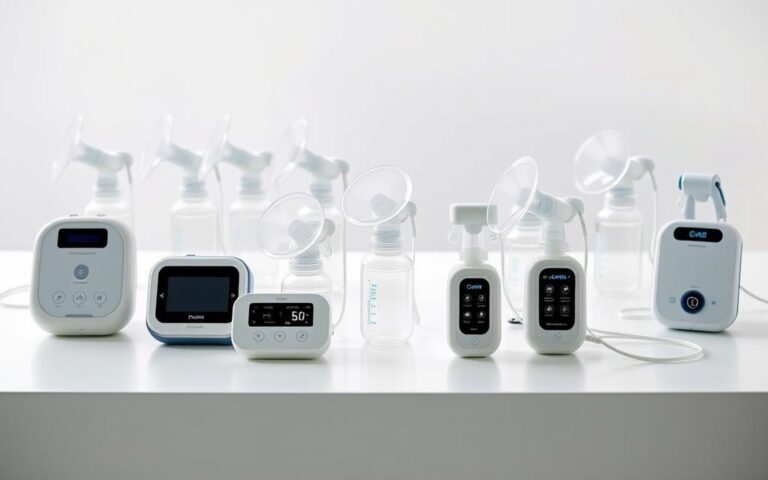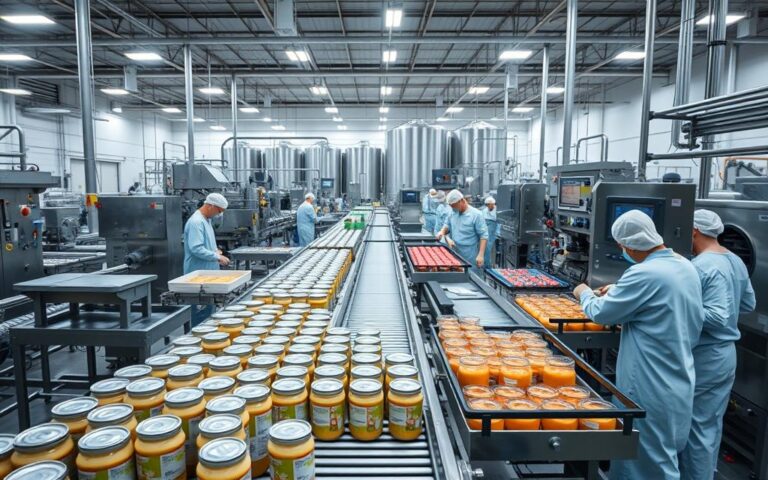Foods to Avoid for a Healthy Breastfed Baby

A well-balanced diet is key for both mom and baby. Knowing which foods to avoid is important. It helps keep your baby healthy.
As a new mom, you might wonder about the foods to steer clear of. This ensures your baby stays healthy. It’s all about making the right choices for your baby’s health.
It’s important to know which foods can harm your baby. Some can cause allergies or make them fussy. By choosing wisely, you create a safe space for your baby to grow.
By making smart food choices, you support your baby’s health. A balanced diet is essential. It means avoiding foods that could harm your baby.
Key Takeaways
- A well-balanced breastfeeding diet is key for both mom and baby.
- Certain foods can harm your baby, so it’s vital to know what to avoid.
- A healthy diet means being careful about the foods you eat, which is important for your baby’s health.
- Some foods can cause allergies or make babies irritable.
- Knowing about a balanced diet and avoiding certain foods helps create a safe space for your baby.
- A healthy diet is about finding the right balance and avoiding harmful foods.
Understanding the Breastfeeding Diet-Baby Connection
When a mother is breastfeeding, what she eats is key to her baby’s health. The food she eats can pass through her milk to her baby. This means it’s important to choose foods carefully to avoid any bad reactions.
A balanced diet with fruits, veggies, whole grains, and lean proteins is best. It helps both the mother and the baby get the nutrients they need. This supports the benefits of breastfeeding.
Studies show nursing moms need at least 1,800 calories a day. This number changes based on how active they are and their size. Drinking plenty of water is also important, as moms lose about 25 ounces of fluid daily through milk.
A healthy diet supports lactation. It ensures the baby gets the nutrients they need for growth and development. This shows how vital nutrition is during this time.
Some foods can cause allergies or sensitivities in babies, with dairy being a common one. But only about 3% of exclusively breastfed babies have these issues. Knowing the signs of a food allergy can help moms adjust their diet. This ensures their baby stays healthy and supports breastfeeding benefits.
Common Food Allergens to Watch
As a breastfeeding mom, knowing about common food allergens is key. These can affect your baby’s breastfeeding safety and baby nutrition. Foods like cow’s milk products, soy, and eggs can cause issues in some babies, even if they don’t bother you.
Studies suggest introducing solid foods that might cause allergies should start around 6 months. Waiting too long to introduce peanuts and eggs can raise allergy risks. Watch for signs like spitting up, vomiting, and rashes in your baby.
Here are some important points to remember:
- Most babies (about 90%) will outgrow cow’s milk protein intolerance by the age of 4-6 years.
- The chance of babies outgrowing cow’s milk protein intolerance is about 50% by 12 months.
- An elimination diet usually needs 2-4 weeks to see if symptoms improve after removing a food.
Knowing which foods might cause problems helps you avoid them or introduce them safely. This ensures a healthy environment for your baby to grow and thrive, with proper breastfeeding safety and baby nutrition.
Caffeine and Your Nursing Baby
As a breastfeeding mom, watching your caffeine is key. It can mess with your baby’s sleep and health. Caffeine gets into breast milk and too much can upset babies, making them hard to soothe.
It’s best to keep your caffeine under 300 milligrams a day. That’s like drinking two to three cups of coffee. But remember, caffeine is in more than coffee. Tea, chocolate, and some meds have it too.
Here are some tips for caffeine while nursing:
* Know where caffeine hides, like in some meds and energy drinks
* Pick decaffeinated coffee or tea to cut down on caffeine
* Don’t have caffeine before bed to help your baby sleep better
Being careful with caffeine helps your baby sleep well and stay healthy.
High-Mercury Fish and Seafood Concerns
It’s important to know about mercury levels in fish and seafood. The FDA and EPA say pregnant and breastfeeding women should eat 2 to 3 servings of “Best Choices” fish weekly. This is key for breastfeeding safety because too much mercury can harm babies’ health.
Eating small fish like sardines and scallops is a good idea. The Dietary Guidelines suggest 8 ounces of seafood weekly for a 2,000 calorie diet. Pregnant or breastfeeding women should aim for 8 to 12 ounces of low-mercury seafood each week.
Here are some guidelines for fish consumption:
- 1 serving is defined as 4 ounces measured before cooking
- Consume 2 to 3 servings (between 8 and 12 ounces) of fish per week from the “Best Choices” list
- Eat only one serving of fish caught by family or friends if there are no fish advisories, and refrain from eating other fish that week
Knowing about high-mercury fish and seafood helps you make safe choices for your baby. Always check advisories for fish caught by family or friends. The mother’s diet is the main source of mercury for most breastfed babies before they start eating other foods.
Spicy and Acidic Foods: What You Need to Know
As a breastfeeding mom, it’s important to watch what you eat. Foods like spicy and acidic ones can change your breast milk’s taste. This might affect your baby’s taste buds.
Spicy and acidic foods can add flavor to your meals. But, they might make your baby uncomfortable. Some babies may be more sensitive to these tastes.
To manage spice levels, try these tips:
- Eat smaller portions of spicy or acidic foods to gauge your baby’s reaction
- Avoid eating these foods close to breastfeeding sessions
- Choose milder alternatives to your favorite spicy or acidic foods

It’s best to eat foods like citrus fruits, tomatoes, and vinegar-based dishes in moderation. They’re good for you but might upset your baby. Being careful with your diet helps your baby enjoy a variety of tastes.
Alcohol and Breastfeeding: The Facts
As a breastfeeding mom, knowing about alcohol is key. An occasional drink might not hurt, but too much can cause issues. This includes problems with milk production or a higher risk of SIDS. Keeping your baby’s health first, it’s important to know about alcohol and breastfeeding.
Here are some key facts to consider:
- Alcohol levels in breast milk are highest 30 to 60 minutes after consumption.
- Alcohol can generally be detected in breast milk for about 2 to 3 hours per drink after it is consumed.
- Excessive alcohol consumption can interfere with the milk ejection reflex (letdown) and may shorten breastfeeding duration due to decreased milk production.
To keep your baby’s health safe, wait at least 2 hours after drinking. Knowing the facts about alcohol and breastfeeding helps you make good choices. This way, you can focus on your baby’s health.
Foods That May Cause Gas in Your Baby
As a breastfeeding mom, knowing which foods can make your baby gassy is key. While science hasn’t fully explored this, many moms notice that some foods upset their babies. This can make them feel uncomfortable and fussy.
Beans, broccoli, and dairy products are often culprits. Foods high in fiber are hard for a baby’s stomach to digest. Cabbage, cauliflower, and garlic can also make some babies feel gassy.
Watching what you eat can help your baby feel better. Try keeping a food diary. This can help you see which foods might be causing trouble. Then, you can change your diet to help your baby.
Here are some tips to help you time your meals for your baby’s comfort:
- Eat smaller, more frequent meals to reduce the amount of gas-producing foods in your system
- Avoid eating gas-producing foods before breastfeeding
- Try to identify and avoid any foods that may be causing gas or discomfort in your baby
Being careful about what you eat can make a big difference. It helps create a cozy and happy space for your baby to grow and thrive.
Herbs and Supplements to Avoid While Nursing
As a breastfeeding mom, it’s key to watch what herbs and supplements you take. Some can change how much milk you make or affect your baby’s health. Knowing which ones to steer clear of is important for your baby’s safety.
It’s important to know the risks of certain herbs and supplements. Some, like fenugreek and fennel, might help with milk supply. But, there’s not much research on their safety for nursing moms and babies. On the other hand, herbs like sage can be risky if you take too much.
To keep your baby safe, try to avoid caffeinated teas. Caffeine can get into your milk. Also, teas with unsafe herbs might not be safe for you while nursing. Here are some herbs to avoid while nursing:
- Parsley
- Sage
- Peppermint
- Fenugreek
- Fennel
Knowing the risks of herbs and supplements helps you make better choices. Always talk to your doctor before taking any new herbs or supplements while breastfeeding. Keep your baby’s health first and foremost.
Creating a Balanced Breastfeeding Diet Plan
A well-planned breastfeeding diet is key for a nursing mom to help her baby grow well. A good breastfeeding diet should have foods from all groups. This includes protein, whole grains, fruits, and veggies.
Vegetables are important, with 3 servings daily. These should include dark greens and yellows. Fruits should be eaten 2 times a day.
Whole grains are also vital, like whole wheat bread, pasta, and oatmeal. Nutrition is very important in a breastfeeding diet. Nursing moms need 500-600 extra calories a day to make milk.
A balanced diet supports baby health and keeps the mom’s energy up. It’s good for her health too during breastfeeding.
Some foods to add to your breastfeeding diet plan are:
- Protein foods 2-3 times per day
- Whole grains daily
- Fruits and vegetables 5 portions per day
- Healthy fats, such as those found in nuts and seeds
By sticking to a good breastfeeding diet and knowing about nutrition and baby health, nursing moms can give their babies the best start.
Conclusion: Nurturing Your Baby Through Mindful Eating
As a breastfeeding mom, it’s key to practice mindful eating. This helps you give your baby the best nutrition. By choosing the right foods for your breastfeeding diet, you support your baby’s growth.
Every baby is different, so what works for one might not work for another. Listen to your baby’s needs and adjust your diet as needed. Taking care of yourself and your baby helps you enjoy the breastfeeding journey. It also sets a strong foundation for your child’s future.






